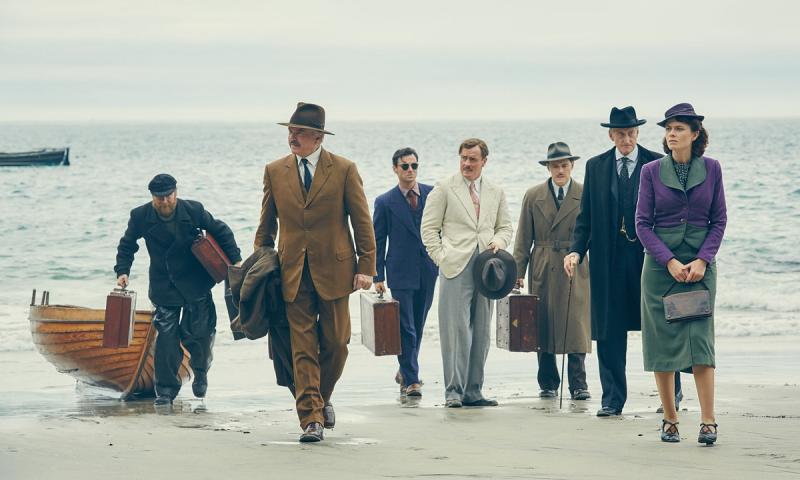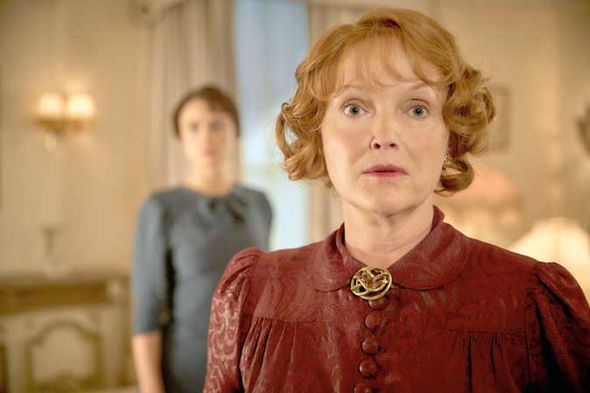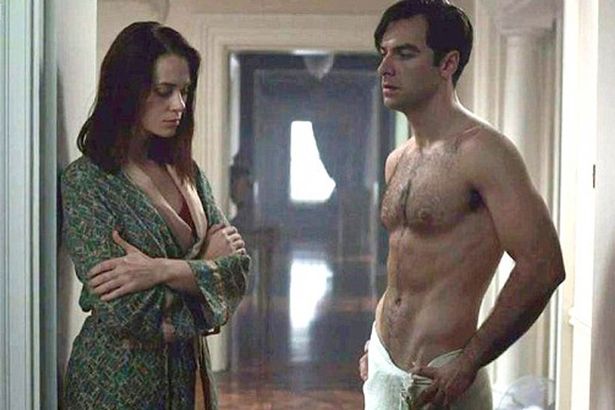And Then There Were None, BBC One | reviews, news & interviews
And Then There Were None, BBC One
And Then There Were None, BBC One
Elegantly cast, well-filmed adaptation of Agatha Christie's most devilish thriller

None, or two? Only the tiniest whiff of spoiler is involved in pointing out that while the stage version, or at least the one I saw with an actor friend playing an early victim, settled for a semi-happy ending, this magnificently brooding adaptation in three parts – just the right length, surely – dooms us to ultimate discomfort, as an especially merciless Agatha Christie intended.
Not least is the sticky problem of the original title and the way it refers to objects pictured within – here, in Sarah Phelps's clever screenplay ten jade soldiers, linked briefly to a deeper interwar theme, which Miranda Richardson’s nasty-prim Emily Brent (pictured below) refers to as "rather primitive" (for which read “phallic”– though elsewhere naughty unChristiean expletives and unseemly habits like coke-sniffing aren’t avoided). It’s hard to believe that the Fontana paperback copy I bought in the 1970s with my pocket money and frightened myself to death still had the offensive title, and an especially bizarre cover to match. I suppose it was at least grammatical while racist, which "were" as applied to "none" of the present labelling strictly isn't.
 The location, apart from the obvious Cornish mainland and beach scenes? Christie supposedly modelled the setting of her isolated house party from hell on Burgh Island Hotel off the south Devon coast, recently restored to its full expensive glory, but as it’s reachable from the mainland at low tide, that wouldn’t do. Director Craig Viveiros’s choice? They’re not saying, but it looks like magical Lundy Island, topped by what has to be a CGI country house (the close-up exteriors and interiors are of Harefield House, Hillingdon, duly deco-ised). In an early scene Anna Maxwell Martin as a tormented servant hovers, if I’m not mistaken, over the geological feature known as the Devil's Cauldron on the west of Lundy. The lights on the island are among the glories captured by the atmospheric, flawless filming.
The location, apart from the obvious Cornish mainland and beach scenes? Christie supposedly modelled the setting of her isolated house party from hell on Burgh Island Hotel off the south Devon coast, recently restored to its full expensive glory, but as it’s reachable from the mainland at low tide, that wouldn’t do. Director Craig Viveiros’s choice? They’re not saying, but it looks like magical Lundy Island, topped by what has to be a CGI country house (the close-up exteriors and interiors are of Harefield House, Hillingdon, duly deco-ised). In an early scene Anna Maxwell Martin as a tormented servant hovers, if I’m not mistaken, over the geological feature known as the Devil's Cauldron on the west of Lundy. The lights on the island are among the glories captured by the atmospheric, flawless filming.
The cast was about as good as it gets. Star names are not always a guarantee of long-term survival, rather the essential mix is one of superb old hands and attractive youth. Quality was guaranteed by Richardson, Sam Neill’s army man, Charles Dance’s cool, collected judge and Toby Stephens as an hysterical surgeon (canny placing for an occasionally hysterical actor). Burn Gorman lent a Dickensian twist as a superficially comical weak arm of the law.
 On the glamorous side were Maeve Dermody's anxious, not-quite-ingenue and two splendid specimens of male eye candy, the pretty (Douglas Booth) and the rugged (Aidan Turner, eyes magnificently smouldering from the off). In fact it’s now easier to imagine the crinkly-haired Ross Poldark of recent BBC fantasy as a potential James Bond thanks to the DJ and the smart haircut – bringing him closer, looks-wise, to a short-term Bond, Timothy Dalton – and stripping to the waist was bound to be obligatory. Of course the scene featuring the fine torso of this version's Philip Lombard (pictured above, Turner with Dermody) was absolutely indispensible, wasn’t it?
On the glamorous side were Maeve Dermody's anxious, not-quite-ingenue and two splendid specimens of male eye candy, the pretty (Douglas Booth) and the rugged (Aidan Turner, eyes magnificently smouldering from the off). In fact it’s now easier to imagine the crinkly-haired Ross Poldark of recent BBC fantasy as a potential James Bond thanks to the DJ and the smart haircut – bringing him closer, looks-wise, to a short-term Bond, Timothy Dalton – and stripping to the waist was bound to be obligatory. Of course the scene featuring the fine torso of this version's Philip Lombard (pictured above, Turner with Dermody) was absolutely indispensible, wasn’t it?
Well, almost. Undress goes hand-in-towel with the cunning, steady deconstruction of period-drama gloss. Things and people fall apart as sleep, trust and propriety go out of the window. Sex rearing its head certainly isn't too improbable, just a subtexting of what's already latent in the book. The serialisation also has extra layers of flashbacks and ghosts of the soon-to-be victims' unsavoury pasts (cue an extra turn of the bloody screw). And the end, while faithful to the original's chill conclusion, is even more cruel.
A well-behaved review simply can’t give away any of the twists, only admire how immaculately plotted both the original and the adaptation both are. There’s no reassuring detective to right all wrongs like Hercule Poirot or Miss Marple, only a fiendish stage-manager a good deal more convincing, because until the end unknown, than Vincent Price in Theatre of Blood. If, like me and millions of others, you already know whodunnit from having read the book, even if you can't remember the whys and wherefores of the murders, it's still bound to make your flesh creep and your stomach knot.
rating
Share this article
Add comment
The future of Arts Journalism
You can stop theartsdesk.com closing!
We urgently need financing to survive. Our fundraising drive has thus far raised £49,000 but we need to reach £100,000 or we will be forced to close. Please contribute here: https://gofund.me/c3f6033d
And if you can forward this information to anyone who might assist, we’d be grateful.

Subscribe to theartsdesk.com
Thank you for continuing to read our work on theartsdesk.com. For unlimited access to every article in its entirety, including our archive of more than 15,000 pieces, we're asking for £5 per month or £40 per year. We feel it's a very good deal, and hope you do too.
To take a subscription now simply click here.
And if you're looking for that extra gift for a friend or family member, why not treat them to a theartsdesk.com gift subscription?
more TV
 Murder Before Evensong, Acorn TV review - death comes to the picturesque village of Champton
The Rev Richard Coles's sleuthing cleric hits the screen
Murder Before Evensong, Acorn TV review - death comes to the picturesque village of Champton
The Rev Richard Coles's sleuthing cleric hits the screen
 Black Rabbit, Netflix review - grime and punishment in New York City
Jude Law and Jason Bateman tread the thin line between love and hate
Black Rabbit, Netflix review - grime and punishment in New York City
Jude Law and Jason Bateman tread the thin line between love and hate
 The Hack, ITV review - plodding anatomy of twin UK scandals
Jack Thorne's skill can't disguise the bagginess of his double-headed material
The Hack, ITV review - plodding anatomy of twin UK scandals
Jack Thorne's skill can't disguise the bagginess of his double-headed material
 Slow Horses, Series 5, Apple TV+ review - terror, trauma and impeccable comic timing
Jackson Lamb's band of MI5 misfits continues to fascinate and amuse
Slow Horses, Series 5, Apple TV+ review - terror, trauma and impeccable comic timing
Jackson Lamb's band of MI5 misfits continues to fascinate and amuse
 Coldwater, ITV1 review - horror and black comedy in the Highlands
Superb cast lights up David Ireland's cunning thriller
Coldwater, ITV1 review - horror and black comedy in the Highlands
Superb cast lights up David Ireland's cunning thriller
 Blu-ray: The Sweeney - Series One
Influential and entertaining 1970s police drama, handsomely restored
Blu-ray: The Sweeney - Series One
Influential and entertaining 1970s police drama, handsomely restored
 I Fought the Law, ITVX review - how an 800-year-old law was challenged and changed
Sheridan Smith's raw performance dominates ITV's new docudrama about injustice
I Fought the Law, ITVX review - how an 800-year-old law was challenged and changed
Sheridan Smith's raw performance dominates ITV's new docudrama about injustice
 The Paper, Sky Max review - a spinoff of the US Office worth waiting 20 years for
Perfectly judged recycling of the original's key elements, with a star turn at its heart
The Paper, Sky Max review - a spinoff of the US Office worth waiting 20 years for
Perfectly judged recycling of the original's key elements, with a star turn at its heart
 The Guest, BBC One review - be careful what you wish for
A terrific Eve Myles stars in addictive Welsh mystery
The Guest, BBC One review - be careful what you wish for
A terrific Eve Myles stars in addictive Welsh mystery
 theartsdesk Q&A: Suranne Jones on 'Hostage', power pants and politics
The star and producer talks about taking on the role of Prime Minister, wearing high heels and living in the public eye
theartsdesk Q&A: Suranne Jones on 'Hostage', power pants and politics
The star and producer talks about taking on the role of Prime Minister, wearing high heels and living in the public eye
 King & Conqueror, BBC One review - not many kicks in 1066
Turgid medieval drama leaves viewers in the dark
King & Conqueror, BBC One review - not many kicks in 1066
Turgid medieval drama leaves viewers in the dark
 Hostage, Netflix review - entente not-too-cordiale
Suranne Jones and Julie Delpy cross swords in confused political drama
Hostage, Netflix review - entente not-too-cordiale
Suranne Jones and Julie Delpy cross swords in confused political drama

Comments
Never have so many talented
I was looking forward to this
Am I the only one to have
Top hole, that man. In the
Top hole, that man. In the second we saw it, something felt wrong. I should have gone back and freeze-framed to check.
A revolver, unlike an
Merci, M. Poirot.
Merci, M. Poirot.
Get over yourself and enjoy
Thank you for your analysis !
It is not a grammatical
Thoroughly enjoyed it, great
I loved this remake and Aidan